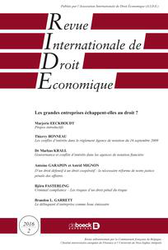June 10, 2020
Thesaurus : Doctrine

Full reference : Fasterling, B., "Criminal Compliance - Les risques d'un droit pénal du risque", Revue internationale de droit économique, 2016/2 (t.XXX), p. 217-237
June 24, 2016
Breaking news

The Autorité des Marchés Financiers (AMF- French Prudential Supervision Authority) set up a Scientific Advisory Board under the supervision of its president Gérard Rameix, who is also president of the AMF.
The Scientific Advisory Board chose ‘Financial education in the digital era’ as the theme of its annual conference, which was held on 20 June 2016 in partnership with Paris School of Economics.
The conference was opened by François Villeroy de Galhau, Governor of the Banque de France (France’s central bank). He stated that financial literacy “shall help everyone make informed decisions”. In this regard, financial literacy is a “factor for economic efficiency and social fairness”, which justifies involvement from public authorities- including, namely, the Banque de France. In partnership with both the Autorité de Contrôle Prudentiel et de Résolution (ACPR- French Prudential Supervision Authority) and the AMF, the Banque de France ought to be a “caring educator, but an attentive regulator”, as it is “imperative that financial literacy and Regulation should be taken forward jointly, as to allow for new technologies to develop, which would be understood by all and for the benefit of all”.
Three roundtables followed. The first roundtable aimed at assessing financial literacy trends and their impact on the financial behaviour of consumers and investors in Europe. The second session focused on the opportunities opened up by new technologies (upon which Fintechs, e.g., crowdfunding platforms, data aggregators and automated financial advice services are thriving) as regards financial behaviours. Lastly, the third panel discussion, which involved several French (AMF, Institut National de la Consommation- INC, French National Institute for Consumer Affairs) and European (European Commission) Regulators, draw conclusions from the first two roundtables and discussed on the issues that an increasingly digitalised financial education raises for Regulatory authorities.
Since this conference raises many crucial questions for Regulation, it is important to recall what has been said in the panel discussion on the role of Regulator with regards to financial education (I.) before sharing some thoughts on this matter of particular interest (II.).
Feb. 14, 2015
Sectorial Analysis

The repression is inseparable from how to repress. This is why the procedural difficulties are indicative of underlying fundamental problems. Currently, the basic issue updated by the battles around the procedures of financial sanctions is about the sanction bais.
For the regulator, the penalty is one tool among others to regulate financial markets. The penalty in a continuum with its legislative powers, are its teeth and claws through which financial markets are developing. The purpose of financial policy justifies an objective repression with a probationary system often based on presumptions leading to impute breaches players in some positions on or financial markets. The regulator must have this card in hand and use it according to this method.
Moreover, if it happens that people commit reprehensible misconducts, perceived as such by the social group, they should be punished, possibly up to the prison. Only the criminal justice is legitimate to do so legitimately weighed down by the burden of proving intentionality, etc.
We must distinguish these two types of criminality. It is from there that the two procedures and two probationary systems can take place at the same time but on different offenses.
For now this is not the case, as "financial misconduct" are only the carbon copy of "financial crimes" lightened loads of evidence that protected the defendant and who should answer for now twice.
Procedural problem? No, problem of criminalization, which won't be released by procedural solutions, the most hazardous being to create a new institution, the most calamitous being to weaken the system by removing one of the ways of prosecution. It is necessary to make distinctions in the offenses that are currently redundant.
Thus, repression as a regulatory tool used by the Regulator is in focus, but the real financial criminal law remains to be consolidated to achieve its own and classic goal: punish faults including through the prison.
Updated: Dec. 12, 2011 (Initial publication: Dec. 12, 2011)
Thesaurus : Doctrine
